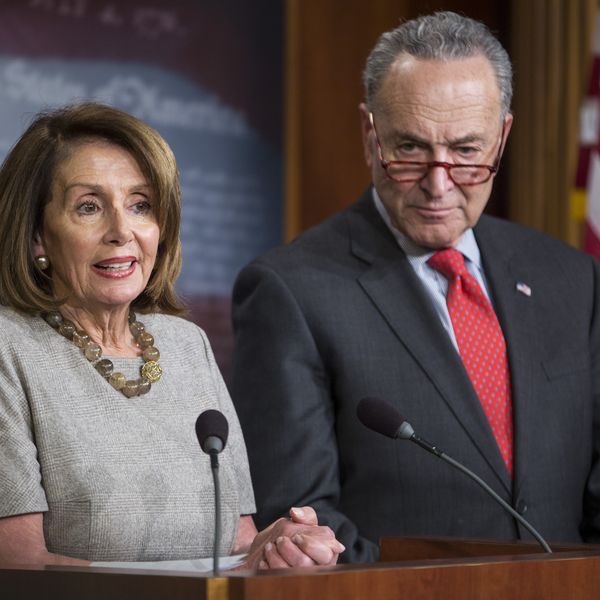On New Year's Day, the Senate and House passed a "fiscal cliff" deal by respective votes of 89-8 and 257-167. The deal has some good parts. It lets the Bush tax cuts expire on the wealthy, raises the estate tax marginally and increases taxes on capital gains and dividends a bit. Unemployment benefits are extended for a year. Tax boosts for the low paid workers - the child tax credit, expanded earned income credit, refundable tuition tax credits - are extended, if only for five years. Social Security, Medicare and Medicaid are not touched.
But no one should be fooled. This is an ugly deal, with foul implications for the coming months.
1. Setting Up the Next Extortion
The most ominous part of the deal is what was left out. The deal makes no provision for lifting the debt ceiling. It postpones the sequester (automatic cuts in domestic and military spending) for only two months. It is a smaller deficit reduction package than that originally sought by the president. It therefore sets up the right-wing House zealots to hold the economy hostage once more, while demanding deep cuts in public services (known as cuts in domestic spending), backed by a media frenzy about deficits. And while Social Security, Medicare and Medicaid escaped unscathed in this deal, they will be the prime targets in the coming debate.
2. Hiking Taxes for Working Americans; A Million Jobs Lost
By allowing the payroll tax cut to expire, every working American gets a tax hike of 2% of their income (up to about $113,000 in income). A worker making $50,000 a year will pay an extra $1,000 in taxes. Payroll checks will be cut. Belts will have to be tightened even more. That will lower demand, producing job loss totaling up to an estimated million jobs. (Taxes on the wealthy go up also, but those have only marginal effects on jobs).
3. Compromising the Compromising President
President Obama sensibly told Republicans that he would not sign any bill or agree to any deal that extended the Bush tax cuts on those making over $250,000. He had stumped on that across the country on this pledge and received a mandate from the voters. Polls showed the majority of Americans were with him. With all the Bush tax breaks due to expire, Republicans were faced with letting taxes go up on everyone just to defend tax breaks for the richest Americans. The President began the negotiations saying this was not negotiable. He could not have been in a stronger position.
But he chose to compromise. The Bush tax cuts will be allowed to expire on couples making over $450,000. This costs about $150-200 billion in revenue over 10 years. The president argues he got the important extension of unemployment insurance and the working poor tax credits in return. But these could have been folded into a package after going over the cliff. And the cost to the president is significant. Once more Republicans have learned that obstruction works, that the president will always blink.
The next extortion - the debt ceiling, automatic sequester - in the next eight weeks makes this a big deal. The President says sensibly that he will not negotiate over lifting the debt ceiling. Period. And now there is even less reason for the Republicans to believe him than before. This encourages extreme demands rather than discouraging them. This was the time to draw the line.
4. Feeding the deficit distraction
The deal is already being denounced in the mainstream media as "too timid," offering too little in deficit reduction. It guarantees the next eight weeks will be fixated on the debate about what to cut and how much to cut headed into the debt ceiling.
But this entire debate is wrong-headed. You can't fix the debt without fixing the economy. And deficit reduction won't fix the economy. The recovery is too slow and too skewed to put people back to work. Deficit reduction can only slow it further.
We need a big and bold debate about fundamental reforms needed to make this economy work for working people. That includes making big investments vital to our future at a time when we can borrow for virtually nothing - rebuilding and modernizing our decrepit infrastructure, funding R&D, doing at least the basics in education. We need to balance our trade, and revive manufacturing, beginning with capturing a leading role in the global move to clean energy.
We need to address inequality frontally. That requires much more than small marginal increases in taxes for millionaires. It includes raising the minimum wage, empowering workers to organize and bargain for a fair share of the profits they help to generate, limiting perverse CEO compensation schemes. It includes a financial transaction tax that might curb Wall Street gambling.
We need to continue health care reform, taking on the entrenched lobbies -- the drug and insurance companies, the private hospital complexes -- that drive up our medical costs. If we paid per capita what other industrial countries pay for health care, we'd project surpluses as far as the eye can see. We have to fix our broken health care system.
But Washington is talking about none of this. Instead the Congress and the President are going to continue to debate how much more to cut from public services as if that would fix the economy. That debate is likely to turn foul. Republicans use the debt ceiling to demand structural cuts in Social Security, Medicare and Medicaid. They'll likely be willing to repeal or dilute the sequester as an incentive to focus on the core security programs. And they'll be convinced that the president will fold once more.
Americans are struggling with mass unemployment, declining wages, increasing insecurity, Gilded Age inequality. Trimming the deficit addresses none of these, and is likely to slow growth, making things worse.
We've had an ugly debate leading to a wretched agreement. And that agreement only insures that the debate will get uglier.




